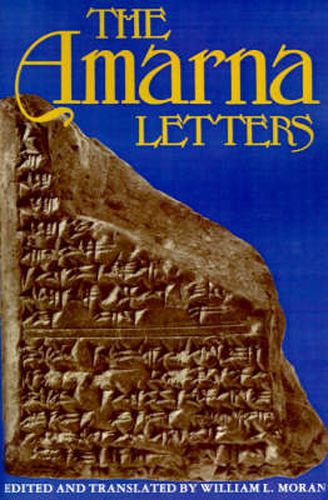Readings Newsletter
Become a Readings Member to make your shopping experience even easier.
Sign in or sign up for free!
You’re not far away from qualifying for FREE standard shipping within Australia
You’ve qualified for FREE standard shipping within Australia
The cart is loading…






An ancient inscription identified some of the ruins at el Amarna as The Place of the Letters of the Pharaoh. Discovered there, circa 1887, were nearly four hundred cuneiform tablets containing correspondence of the Egyptian court with rulers of neighboring states in the mid-fourteenth century B.C. Previous translations of these letters were both incomplete and reflected an imperfect understanding of the Babylonian dialects in which they were written. William Moran devoted a lifetime of study to the Amarna letters to prepare this authoritative English translation. The letters provide a vivid record of high-level diplomatic exchanges that, by modern standards, are often less than diplomatic. An Assyrian ruler complains that the Egyptian king’s latest gift of gold was not even sufficient to pay the cost of the messengers who brought it. The king of Babylon refuses to give his daughter in marriage to the pharaoh without first having proof that the king’s sister – already one of the pharaoh’s many wives – is still alive and well. The king of Karaduniyash complains that the Egyptian court has detained his messenger – for the past six years. And Egyptian vassal Rib-Hadda, writing from the besieged port of Byblos, repeatedly demands military assistance for his city or, failing that, an Egyptian ship to permit his own escape.
$9.00 standard shipping within Australia
FREE standard shipping within Australia for orders over $100.00
Express & International shipping calculated at checkout
An ancient inscription identified some of the ruins at el Amarna as The Place of the Letters of the Pharaoh. Discovered there, circa 1887, were nearly four hundred cuneiform tablets containing correspondence of the Egyptian court with rulers of neighboring states in the mid-fourteenth century B.C. Previous translations of these letters were both incomplete and reflected an imperfect understanding of the Babylonian dialects in which they were written. William Moran devoted a lifetime of study to the Amarna letters to prepare this authoritative English translation. The letters provide a vivid record of high-level diplomatic exchanges that, by modern standards, are often less than diplomatic. An Assyrian ruler complains that the Egyptian king’s latest gift of gold was not even sufficient to pay the cost of the messengers who brought it. The king of Babylon refuses to give his daughter in marriage to the pharaoh without first having proof that the king’s sister – already one of the pharaoh’s many wives – is still alive and well. The king of Karaduniyash complains that the Egyptian court has detained his messenger – for the past six years. And Egyptian vassal Rib-Hadda, writing from the besieged port of Byblos, repeatedly demands military assistance for his city or, failing that, an Egyptian ship to permit his own escape.